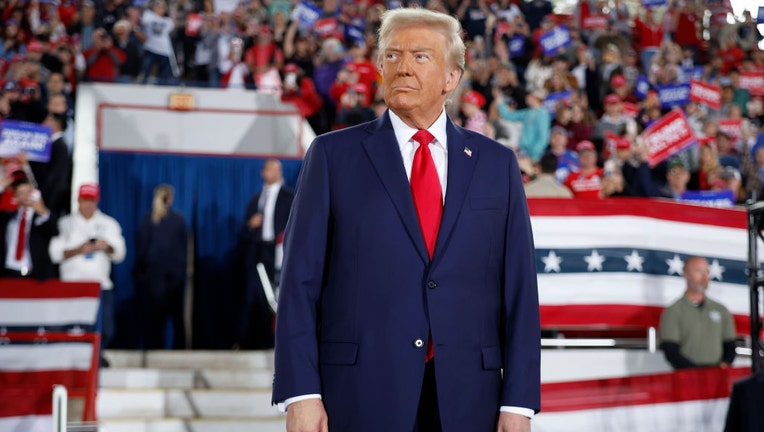Trump considers adding 36 countries to travel ban

FILE-President Donald Trump appears at a rally in North Carolina. (Photo by Chip Somodevilla/Getty Images)
President Donald Trump is mulling expanding his travel ban policy to 36 additional countries, according to an internal memo from the State Department reviewed by Reuters and The Washington Post.
The memo, signed by U.S. Secretary of State Marco Rubio, details a 60-day timeline for the new countries possibly added to the list to meet U.S. security requirements and identity-verification criteria. These nations could face a full or partial travel ban.
This potential move by the administration would follow a proclamation Trump signed on June 4 that banned citizens from 12 countries from entering the U.S.
Why is the Trump administration discussing expanding the travel ban?
Why you should care:
The Washington Post reported that the State Department listed specific concerns which have the 36 countries under review, which the memo states are a "lack of a competent or cooperative government by some of the countries mentioned to produce reliable identity documents."
Citing the memo, Reuters noted that some of the nations were not cooperative in assisting with the removal of their nationals from the U.S. who were ordered to be removed. The memo added that some countries were overstaying the U.S. visas their citizens were being granted.
RELATED: Trump announces travel ban on a dozen countries: Here’s what to know
The State Department in the memo also expressed worries that the citizens of the countries were participating in acts of terrorism in the U.S., or antisemitic and anti-American activity.
"The Department has identified 36 countries of concern that might be recommended for full or partial suspension of entry if they do not meet established benchmarks and requirements within 60 days," the memo stated.
Which countries could be added to the travel ban?
By the numbers:
The 36 countries that may face a full or a partial travel ban if they do not manage their concerns within the next 60 days are listed below:
- Angola
- Antigua and Barbuda
- Benin
- Bhutan
- Burkina Faso
- Cabo Verde
- Cambodia
- Cameroon
- Cote D'Ivoire
- Democratic Republic of Congo
- Djibouti
- Dominica
- Ethiopia
- Egypt
- Gabon
- The Gambia
- Ghana
- Kyrgyzstan
- Liberia
- Malawi
- Mauritania
- Niger
- Nigeria
- Saint Kitts and Nevis
- Saint Lucia
- Sao Tome and Principe
- Senegal
- South Sudan
- Syria
- Tanzania
- Tonga
- Tuvalu
- Uganda
- Vanuatu
- Zambia
- Zimbabwe
Trump’s past travel ban
The backstory:
In January 2017, President Donald Trump issued an executive order during his first term in office banning travel to the U.S. by citizens of seven predominantly Muslim countries — Iraq, Syria, Iran, Sudan, Libya, Somalia and Yemen.
Travelers from those countries were either banned from getting on their flights to the U.S. or detained at U.S. airports after they landed. They included students and faculty members as well as business people, tourists and people visiting friends and family.
The order, often referred to as the "Muslim ban" or the "travel ban," was refined amid legal challenges, until a version was upheld by the Supreme Court in 2018.
The ban affected various categories of travelers and immigrants from Iran, Somalia, Yemen, Syria and Libya, plus North Koreans and some Venezuelan government officials and their families.
The Source: Information for this story was provided by The Washington Post and Reuters, which reviewed the State Department memo about the expansion of the travel ban, Newsweek, and previous LIVENOW from FOX reporting. This story was reported from Washington, D.C.

